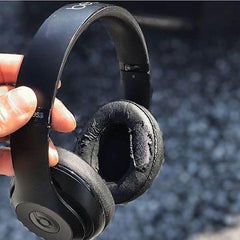Are Wireless Headphones Safe?

Is it safe to wear wireless headphones? Truthfully, there doesn’t seem to be a definitive answer. Industry assurances, government guidelines and many scientific studies believe that it is. But then there are the articles and posts citing opinions or papers or other studies that disagree. It’s a question that seems to come around every few years: are wireless headphones safe?
A recent article on AirPods and Bluetooth headphones published on the Medium website doesn’t believe that they are. The post quotes a petition signed by more than 250 scientists calling on the United Nations and World Health Organisation to ‘strengthen its guidelines on Bluetooth devices.’ Markham Heid — author of the article — explains that wireless headphones expose users to ‘high levels of radiofrequency radiation’. He is particularly concerned for anyone regularly wearing AirPods as these wireless earbuds sit directly inside the ear canal.
He’s not alone in believing that headphone radiation could lead to cancer, neurological issues and DNA damage.
Apple insists that they comply with safety guidelines but with so many different scientists, manufacturers and users at odds about whether Bluetooth headphones are safe to use — who do you trust?
Could we really be putting our health at risk for the convenience of cutting the cord between our device and ears? And how worried should we really be?
What are Wireless Headphones?
This isn’t a trick question.
Wireless headphones can connect to a device without a wire or cable. The technology is now so common than in 2016, Apple removed its headphone jack entirely. Wireless technology relies on radio or infrared signals to transmit information between the headphone and its paired device. Most wireless headphones will use Bluetooth technology. This short-wave transfer of information (from device to headphone) is low-power and enables compressed digital audio signals to be transmitted through the air. For many people, the issue with wireless headphones isn’t so much about concerns of radiation but that the compressed sound files result in poorer sound quality (for audiophiles at least).
Why Are Wireless Headphones Popular?
Wireless headphones are easier to wear if you’re moving around in them. Often people use them during exercise because there’s no wire getting in the way of your workout. During exercises that involve concentration — weightlifting for example — there isn’t a need to keep moving the wire or having to snake it under clothes. Most Bluetooth headphones have a range of around 33 feet so you don’t even need to have your device on you. It’s good news for women as female gym wear often doesn’t have pockets.
Most Bluetooth devices can comfortably handle a distance of 20-25 feet with little problem and in some environments, headphones can manage up to 33 feet. If you’re doing weights or circuits, then it can be safer without wires.
Bluetooth used to be a big drain on batteries. Things have improved hugely. Now, we’re seeing a much-improved life for devices that connect wirelessly. Apple’s W1 chip is one example of how wireless can be an attractive addition to a pair of headphones: if you’re using iOS then the W1 chip will give you up to 30 hours battery with a fast-charge function offering a three-hour charge in just 10 minutes. We’ve probably all been caught short at the gym with a dead battery but now even wireless headphones have no excuse.

Wireless headphones used to be expensive but now we’re seeing them priced more competitively. The more readily available the technology the cheaper they should be in the future, too. The Skullcandy Hesh3 Headphones are available for less than eighty pounds.
So, we’ve established that wireless headphones receive a compressed digital audio signal via Bluetooth. We know that they’re popular in the gym and that the price of buying a pair is lower than ever before. We also know that the global headphone industry is worth 13 billion US dollars and that wireless plays a key role in that growth — but are they safe to wear? Is there any truth to concerns that they cause cancer?Are Wireless Headphones Safe?
We’d better hope so.
In 2016 more people purchased wireless headphones than wired. Bluetooth is a form of radiation but it’s such a low-emission form that most of us aren’t concerned about it being dangerous to our health. Many of us have microwaves in our homes. We take long-haul plane trips. We have X-Rays and MRI scans when our doctors tell us to. We get hit by cosmic radiation when we leave our homes. Brazil nuts contain radiation. So we should be fine, right?
Uh oh.
People are worried about radiation from wireless headphones because it's being transmitted to the ear. Think about what happens when you use in-earphones: the bud is literally sticking inside your ear and that’s right next to the brain. On-ear or over-ear headphones sit firmly against the skull.
The question isn’t whether manufacturers are putting consumers deliberately at risk but whether the guidelines they’re operating from (such as those set by the Federal Communication Commission in the US) are strong enough. Guidelines that you may recall caused more than 250 international scientists to sign a petition saying they’re not stringent enough.
At the end of 2018, we wrote a post asking if it was safe to wear noise-cancelling headphones. A number of users had reported headaches and feeling generally unwell even after just short periods of wearing them. The symptoms sound similar to what Defender Shield discuss on their website: people reporting headaches, depression and tinnitus. There’s no getting away from it that when we’re putting things on, over or in our ears that we should be careful. Our brains are literally next door.

It’s tempting to assume that Bluetooth isn’t safe then. When you mention radiation people tend to get a little nervous. Companies can make a lot of money from selling products to fearful people. It’s easy to flip the fear around and wonder at the agenda of some of these businesses. It’s easy to exploit someone’s ignorance with snake oil.
One of the most interesting and well-rounded articles we’ve read on the subject recently was from the SoundGuys website. Categorically, they believe wireless headphones ARE safe to wear. They explain the science, too, and make it sound a lot less terrifying. You can read what they have to say here but ultimately, it’s that Bluetooth radiation is non-ionizing which means it isn’t powerful enough to mess up your DNA or cause tumours. It’s ‘very much different to Gamma rays’. The SoundGuys post makes it clear:
“Bluetooth, WiFi and Cellphone radiation do not have the power to damage DNA on its own.”
It’s understandable that we’re a little antsy about Bluetooth technology. It still feels a bit like witchcraft no matter how common it now is but there’s no direct evidence that it is damaging to our health. For the time being, it the biggest danger of wearing wireless headphones is still the same as wearing wired ones: if you listen too loudly you can cause permanent hearing loss.
Do you wear wireless headphones? Are you worried that they may not be safe? Drop us a comment in the box below and let us know.
Working out in wireless headphones? Add sweat-proof headphone covers to protect your sound from moisture damage. EarHugz come in a range of awesome designs and for every pair purchased, £1 is donated to the Mental Health Foundation.







